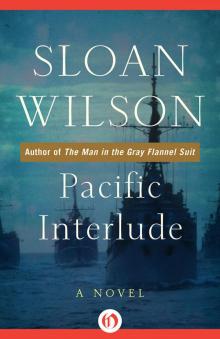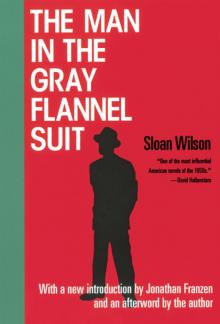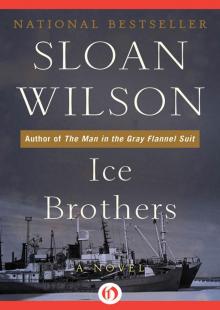- Home
- Sloan Wilson
Ice Brothers Page 5
Ice Brothers Read online
Page 5
“What else?” Paul asked drily.
“Plenty else! The Germans have long-range planes which can patrol the east coast of Greenland. And they’re always sending weather ships up there—they need to know Greenland weather just as much as we do, to make forecasts for the bombers in Europe. It’s only a matter of time before they try to establish weather bases in Greenland, just the way we have. It takes maybe five men to man a weather base, instead of at least thirty for a weather ship. I bet that we’re going to have a big job stamping out their weather bases.”
“Anything more?” Paul asked.
“Plenty more. You’ve got a lot of floating mines in Greenland, some maybe left by subs, and more that have been brought by the currents from Europe. And at least one big German battleship has come within sight of Cape Farewell, the southern tip of Greenland. Don’t get the idea that you’re going into some backwater, far away from any possibility of action. You’re going to have to keep your eyes peeled up there all the time.”
“I’ll remember that.”
“Let me be honest with you,” Chris said. “Greenland is a fascinating place—I’ve been there. The worst part of your assignment is that you’ve got a trawler. Those ships can’t carry any real armament and they couldn’t get out of their own way in any kind of action. The only reason that we’re sending them up there is that they’re about all we’ve got, except for a few icebreakers, that can handle ice.”
“Well, I asked for a small ship.”
“You’ve got one—there are plenty of tugs bigger than those trawlers. And you’re going to have a nonregulation skipper of some kind, probably a good ice pilot, but those guys don’t often turn out to be what you’d call an officer and a gentleman. To tell you the truth, I wouldn’t blame you if you tried to have your orders changed. That can sometimes be done.”
“How?”
“Get the skipper of some other ship to ask the personnel officer for you. I have a friend who’s got a hundred-and-sixty-footer down in the Caribbean. She’s a real Coast Guard cutter and he’s a real Coast Guard officer. At least you won’t freeze to death down there. Want me to see what I can do?”
“No,” Paul said. “Thanks a lot, but I wouldn’t really feel right about that. Anyway, you’ve got me all curious about Greenland.”
“Good,” Chris said with a booming laugh. “I doubt if I could have swung it anyway, but I wanted to see if you’d go for it. I think you have the makings of a real Coastie. Katie, come out here and rustle up some chow. Let’s give the condemned man the best meal we can!”
“I have to get home,” Paul said. “Sylvia is waiting for me.”
“Well, you hurry right on along then,” Chris said. “And my advice to you is, get all the screwing in you can before you head north, because you won’t get much in Greenland unless you learn to catch an Eskimo, and that ain’t as easy as you’ve probably heard tell.”
CHAPTER 6
At the district office early the next morning Paul was told that the Arluk was being outfitted in a small yard in East Boston. He took a taxi there. It was a windy day and though the April sunshine was bright, there was no warmth in it. Paul was wearing his brand new blue greatcoat with shoulder boards emblazoned with his proud single gold stripes. It seemed a rather theatrical getup and he fought a feeling that he was all dressed up to go to a costume ball of some kind. As the taxi drove along the waterfront, he saw that the many shipyards which ringed the harbor were crowded with great gray aircraft carriers, sleek destroyers, freighters, vessels of every kind. So many acetylene torches were being used that each yard appeared to be celebrating the Fourth of July.
Finally the taxi turned down an alley and stopped at a wire gate. As Paul got out of the car a petty officer in a pea coat with the collar turned up to protect his ears stepped out of a sentry box and saluted him smartly.
“What ship, sir?”
This was the first time anyone had saluted Paul and also the first time in his twenty-two years that anyone had called him “sir.” The petty officer was at least twenty years older than he, a heavyset man who slightly resembled his father. Paul felt ridiculous and the thought crossed his mind that the man might be mocking him, but his expression was dead serious.
Sort of brushing the visor of his cap in a casual return of salute, Paul said, “The Arluk, thank you.”
“Identification, sir?”
Paul had not yet been issued a card, but his orders sufficed.
“She’s lying right at the end of the south pier, outboard of the Nanmak.”
The fact that nonsense syllables had apparently been used to name these vessels somehow seemed an appropriate part of this Alice-in-Wonderland adventure. The taxi man dragged Paul’s footlocker and his sword in its leather case from the trunk of the car. Dissatisfied with the quarter tip Paul gave him, he gave a burlesque of a salute, said, “Thanks a lot, sir,” and roared off. His contempt somehow struck Paul as more reasonable than the respect shown by the petty officer.
“I’ll have your gear put aboard for you, sir,” the petty officer said.
“Thank you.”
Paul strode through the gate in the wire fence, feeling that now he was really entering the service. Eager to see his ship, he walked fast. This yard was building sub chasers and a row of the sleek craft stood on the ways. An old four-stack destroyer obscured his view of the south pier. The bright lights of welding and cutting torches made him blink and the sound of riveting guns and air hammers made it difficult to think. The smell of the harbor at low tide filled his mind with memories of the Valkyrie, and he half expected to see the old yawl, but by now she existed nowhere at all, and she didn’t belong in this time and place anyway. When he passed the high bow of the destroyer, he saw two beam trawlers moored at the end of the pier. Because Chris had told him they were no bigger than a tug, they looked much larger than he had expected. They were, perhaps, no more than twice the length of the Valkyrie, but were so much beamier and higher that they probably had more than ten times the tonnage. There was no real comparison between them and the old yawl. The trawlers looked like huge bulldogs, while the yacht had been a toy poodle.
The trawlers were also much more handsome than Paul had expected with the beauty of strength instead of grace. Their high, flared bows looked as though they could punch into the highest seas without danger. Their well deck amidships was only about four feet above the surface of the water, but the sterns were high and handsomely rounded. The only things streamlined about the ships were their short oval smokestacks, which were tilted aft at a rakish angle. They had short stubby masts and heavy freight booms. The ships had been freshly painted with irregular patterns of light blue and white, ice camouflage. There was an air of excitement about them which stemmed from the fact that these little vessels had the ability to live in Arctic seas and ice which would sink thin-skinned destroyers and most of the other ships which towered over them.
The two trawlers were so alike that one resembled a mirror image of the other, but as he walked closer, Paul saw that the inboard vessel already had a stubby cannon on her foredeck, a steel platform for antiaircraft guns amidships and racks of depth charges on the stern which workmen were in the process of adding to the Arluk. Before a wooden gangway that led from the pier to the Nanmak Paul hesitated. There was a whole rigamarole about boarding a Coast Guard or navy ship which he had read about in a copy of the Watch Officers’ Guide, which Chris had given to him and he supposed that he better try it. As he reached the rail of the ship he paused, saluted the quarterdeck (although why he should salute a deck he had no idea), and said to a young seaman who was lounging by the rail, “Request permission to come aboard.”
The seaman looked at him oddly and said, “Come ahead. You want someone aboard here or the Arluk?”
“The Arluk.” The decks of the ships were of bright new pine—apparently these vessels had just been built. Picking his way through a tangle of hoses, lines and piles of stores which had not yet been stowed, Paul climbed over the rail to
the Arluk. He didn’t bother with saluting the quarterdeck this time, but seeing a short, stout old man in a knitted blue watchcap and a khaki parka, he said, “Permission to come aboard?”
“Why come right ahead,” the man said with a pronounced Maine accent, and his ruddy face broke into a surprisingly sunny, almost childlike smile. “You ain’t our new skipper, be you?”
“I guess I’m supposed to be the executive officer,” Paul said, sounding pompous to himself, and added his name.
“I’m the boatswain—Seth Farmer. We don’t have what you’d call real officers’ quarters aboard here, but I’ll show you your bunk.”
He led the way down a steep companionway near the stern to a dimly lit compartment, all white wood with two bunks on each side and a table in the middle. As they entered, an ensign in his mid-twenties who was lying in the forward, starboard bunk looked up from the book he had been reading. He had a thin, melancholy face, thick glasses and a hooked nose, which gave him an owlish, scholarly appearance.
“This is Mr. Green, our communications officer—he just came aboard about an hour ago,” Farmer said. “Mr. Green, this is Mr. Schuman, our new exec.”
“Pleased,” Green said, and began to climb out of the bunk. Because the deck above the mattress didn’t quite give his tall frame sitting headroom, it was difficult for him to do this gracefully. He bumped his forehead and had difficulty untangling his long legs from a blanket before he stood up, a gaunt, stooped man six feet, two inches tall who had been described as resembling a “Jewish Abe Lincoln.”
“Glad to meet you,” he said, shaking Paul’s hand firmly. “This is my first sea duty. I’m afraid you’ll find I have a hell of a lot to learn.”
“It’s my first day in the Coast Guard,” Paul said with a rueful laugh. “How about you, Mr. Farmer?” He wasn’t quite sure whether to be so formal in the use of names, but the watch officer’s guide had demanded it.
“Well, I wouldn’t say that this is exactly my first sea duty,” Farmer replied, his Maine twang somehow making it obvious that he had spent at least thirty years sailing the oceans of the world, “but I don’t know much about the Coast Gad. I’ve been a fisherman all my life. I sort of came with this vessel, you might say, like the trawl winch. They’re taking off the rest of the fishing gear, but I guess they’re going to leave me aboard.”
“I’m glad that we’ve got somebody who knows what he’s doing,” Paul replied, deciding that honesty must be the best policy. “I’ve been to sea a little, but to tell the truth, I’m just a summer sailor, and I have just about everything to learn about a ship like this.”
Farmer’s smile illuminated his curiously innocent round, ruddy face.
“That’s the way things go in time of war—first you get the job and then you learn how to do it. There will be plenty to keep you busy, but you young fellers look smart enough to catch on fine before long. You want a cup of coffee?”
“That’s just what I want,” Paul said.
“We don’t have a skipper aboard this hooker yet, and we don’t rightly have an engineer, but we got the damnedest, finest cook I ever seen afloat. They say he used to be some kind of a real fancy hotel chef before he joined up, and I believe it. He’s been baking this morning and I can hardly wait to see what he’s going to come up with this time.”
Green said nothing but listened attentively and smiled. As Farmer led the way to the galley in the forecastle, Green followed, hitting his head on the hatch on the way out and laughing ruefully at his own ungainliness.
The forecastle was a low-ceilinged, V-shaped compartment about thirty feet long with three tiers of bunks on each side for the thirty enlisted men who would make up the crew, and a long, V-shaped table in the middle. Around this table about a dozen young seamen now sat, greedily grabbing fresh blueberry muffins from large platters. In the door to the adjoining galley a short man about forty-five years old stood in a white apron. He wore a tall white chef’s hat, which even Paul knew to be outlandish aboard a trawler or a Coast Guard cutter. When he saw the officers he grinned in a curiously obsequious but sly way and in a thick foreign accent said, “What will it be, gentlemen? Blueberry muffins, apple cake or cherry tarts? Don’t tell me. I’ll fix you a selection.”
Without being asked, a seaman poured coffee from a big pot on the table into white mugs for the two ensigns and the warrant boatswain.
“We need more milk, Cookie,” he called.
“Get it yourself,” Cookie replied haughtily as he appeared with a tray of pastries which would have graced the fanciest of restaurants.
“I never seen anything like this aboard any vessel of any description in my whole life,” Farmer marveled as he helped himself to a cherry tart. “Where did you learn to cook like this, Cookie?”
“Where?” Cookie replied, drawing himself up to his full height of five feet, six inches, which bent his chef’s hat against the overhead. “Where did I learn my profession? Why in the best hotels of Switzerland, of course, in the Cordon Bleu in Paris, and at the Ritz-Carlton here in Boston. And after all that, this Coast Guard makes me a third-class cook!”
“Now don’t you worry about that, Cookie,” Farmer said. “As soon as we get us a skipper aboard here, we’ll all recommend you for a promotion just as quick as the regulations allow. As far as I can see, you ought to be a regular admiral of cooks if they rate them up that high.”
“Thank you, sir,” Cookie replied with an almost Oriental bow. “I shall always try to please.” Still bowing and smiling in his sly, obsequious way, he backed into his galley and disappeared.
The enlisted men had fallen silent at the approach of the officers, but now a coxswain who looked and talked like a bright college boy, said to Paul, “Sir, are you going to be stationed aboard here?”
“It looks that way.”
“Are we going to Greenland?”
“I guess that’s supposed to be a secret, isn’t it?”
“Well, we figure from the way this ship is painted and the way they’re beefing up the bow with steel plates and all, it sure doesn’t look like we’re headed for the jungles of New Guinea,” the coxswain said and everyone laughed.
“You might say that,” Farmer said, “but the way the Coast Gad does things, they might send an icebreaker to New Guinea after all.”
More laughter.
“Sir,” the coxswain continued to Paul, “did you see the news this morning about Greenland? It was in the Record.”
“No. What is it?”
“The Northern Light, sir, she captured a German weather ship just five miles off the east coast of Greenland. They had a regular battle, but when our planes came in, the Germans gave up.”
Paul wondered whether Chris had known that when he discussed the German interest in Greenland weather.
“They had a picture of the German ship in the paper,” the coxswain continued. “She’s a trawler just like this, but much bigger and she carries a long gun on the bow, something like a five-inch fifty-one, much bigger than any of our trawlers have. She’s got big antiaircraft guns mounted all over her. The papers don’t say how much of a fight she put up, but you know the Northern Light is just about the biggest cutter we have. I was aboard her just a couple of months ago. She carries two five-inch fifty-ones and two three-inch fifties, along with about six twenty-millimeters. If the Northern Light had to radio for planes to beat a trawler, that must have been some tough ship.”
Well, Paul thought, Erich had said the Germans wouldn’t be easy to beat.
“That’s interesting,” he said. “I’ll try to get a copy of the paper.”
“Sir,” the coxswain persisted, “do you think this means the Germans will give up on Greenland weather, or just come back with ships that are even better armed?”
“I don’t know,” Paul said carefully.
“I do not believe that the Germans can give up on Greenland weather,” Green said, speaking for the first time. His voice was very deep with a New York edge to it, maybe a hint
of a Brooklyn accent. “Without a knowledge of Greenland weather it’s impossible to make accurate forecasts for Europe.”
“Why is that, sir?” the coxswain asked.
“To oversimplify it, Greenland weather moves east, warms up, and that’s what Europe gets two days later. I’m no meteorologist, but I’ve read a lot about it.”
“Thanks, sir. Are you going to be stationed aboard here too?”
“They tell me I’m to be the communications officer.”
“Thank you, sir. When do you think we’ll be getting our skipper?”
“Before we sail, I hope,” Green replied without a smile, but there was a glint of humor in his deep-set eyes.
Paul hardly heard him. He was imagining a German trawler much bigger than this one being outfitted in some Danish or Norwegian yard with enormous guns. Her crew would be made up by experienced sailors, Germans like his own ancestors, but men who knew the Arctic, not a bunch of novices. Such a ship might be heading for Greenland just as the Arluk started north. In what fog-shrouded ice floe would they meet and what would happen?
Feeling restless, Paul excused himself and starting forward, began a minute examination of the ship. The high bow had been reinforced with sheathing of stout oak planks and steel plates. There was a small gun platform on the forecastle head, but no gun yet. The bridge ran the full breadth of the deckhouse, but was not more than six feet deep. There was an engine room telegraph, a wooden ship’s wheel, a magnetic compass, pigeonholes for signal flags and very little else—no fancy modern equipment or naval gadgetry. A door with a new metal sign saving “Commanding Officer” stood open at the afterside of the bridge. After a moment of hesitation, Paul stuck his head in. There was a bunk, a big chart table with a stool and another door that had been newly labeled “Head—for C.O. only.” The cabin was painted white and trimmed with varnished oak. It was Spartan enough, but Paul imagined the pride he would feel if he ever actually deserved to occupy that space. Dreams of glory! It would be years before he even deserved the job he had. What kind of a man would appear to occupy this stark but somehow royal cabin in the days immediately ahead? Chris had warned him that some of the ice pilots chosen for such jobs were real wild men. Why didn’t they make a man like Farmer a captain instead of a warrant boatswain? Farmer somehow gave the impression of knowing everything in the world about going to sea, and he certainly was no wild man.

 A Summer Place
A Summer Place Pacific Interlude
Pacific Interlude Man in the Gray Flannel Suit
Man in the Gray Flannel Suit Ice Brothers
Ice Brothers